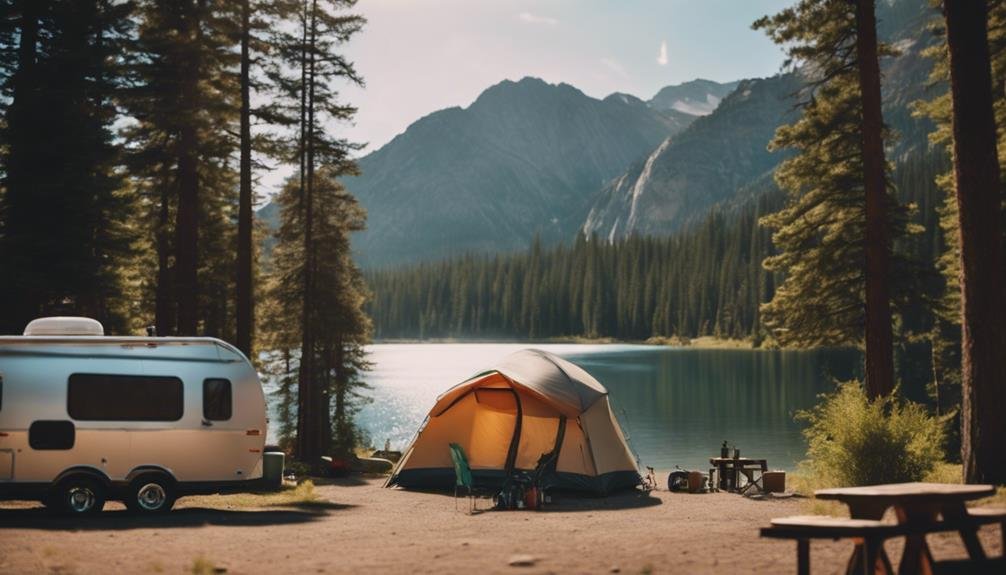
When I'm deciding between backcountry camping and developed campgrounds, I weigh the thrill of immersion in nature against the comfort of amenities. Backcountry camping lets me escape into solitude, but it demands self-sufficiency and preparation. On the other hand, developed campgrounds offer accessible facilities like restrooms and picnic tables, creating a sense of community with fellow campers. I've found that my choice depends on my mood—whether I crave adventure or relaxation. It's essential to consider what experience I seek and balance it with my skills and comfort level. There's so much more to explore in making this decision.
Key Takeaways
- Backcountry camping offers solitude and adventure, while developed campgrounds provide amenities and a sense of community among campers.
- Developed campgrounds feature accessible facilities like restrooms and electrical hookups, unlike backcountry camping, which requires self-sufficiency and planning.
- Physical fitness and navigation skills are crucial for backcountry camping, whereas developed campgrounds cater to various skill levels and provide easier access.
- Safety is a significant factor; backcountry camping involves wildlife encounters and changing weather, while developed campgrounds offer a more controlled environment.
Defining Backcountry Camping
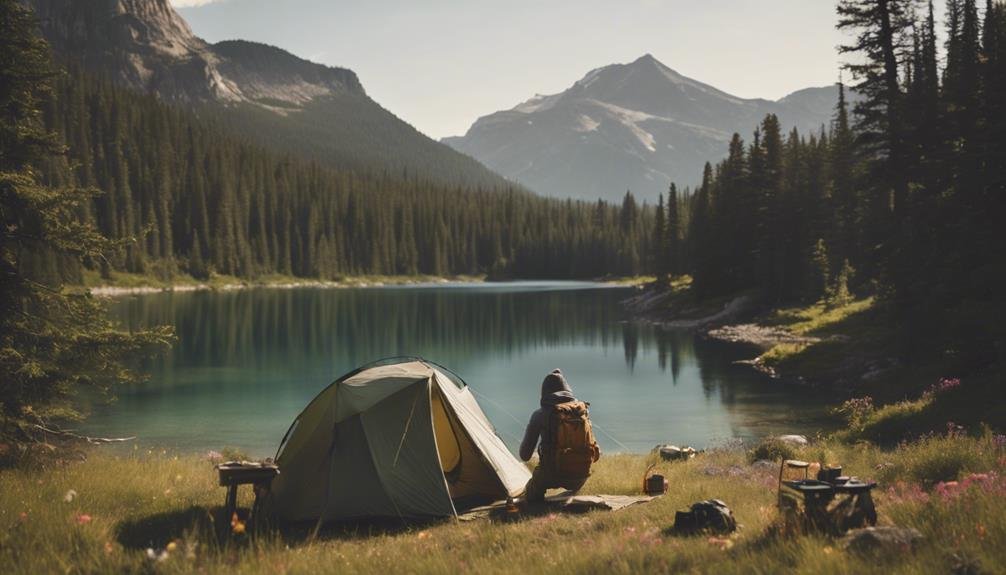
Backcountry camping involves immersing oneself in nature by setting up camp far from developed facilities, allowing for a truly raw and adventurous experience. When I venture into remote locations, I feel an exhilarating sense of freedom that's hard to find elsewhere.
I've always been drawn to the idea of escaping civilization, where I can connect with the earth and enjoy the solitude that comes with it.
One of the most appealing aspects of backcountry camping is the privacy it offers. Unlike crowded campgrounds, I can find a secluded spot to pitch my tent, surrounded by towering trees and the sounds of a babbling brook. This sense of seclusion helps me recharge, away from the noise and chaos of everyday life.
However, I'm also aware of the privacy concerns that can arise in these untouched areas. I make sure to practice Leave No Trace principles, ensuring I respect the land and other campers who might seek the same freedom.
In backcountry camping, I discover both the thrill of adventure and the peace that comes from being alone in nature, making it a perfect escape from the hustle and bustle of modern life.
Understanding Developed Campgrounds
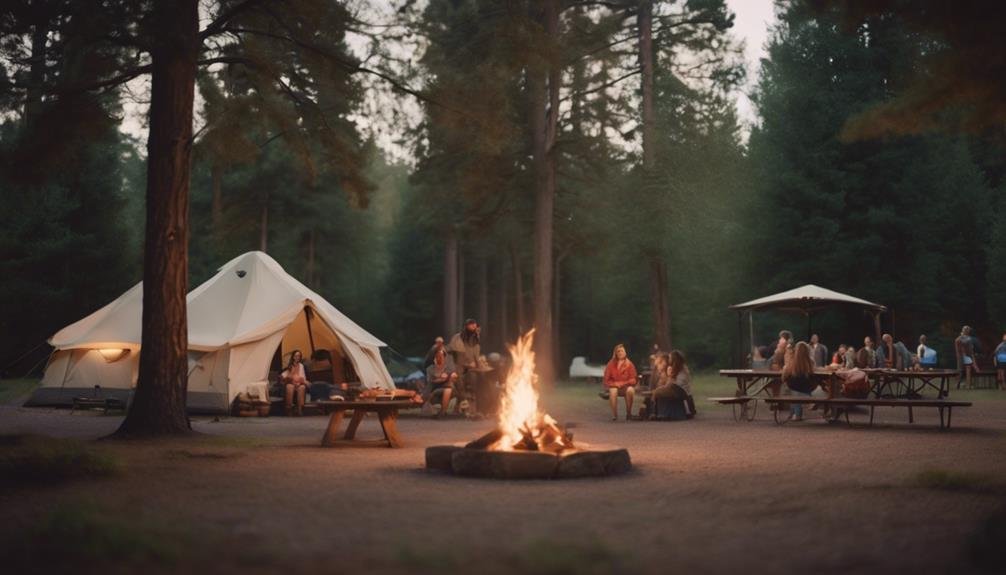
While backcountry camping offers a sense of solitude and adventure, developed campgrounds provide a different kind of experience, blending convenience with community.
When I arrive at a developed campground, I'm greeted by a more structured environment, where facilities like restrooms, picnic tables, and fire pits create a sense of comfort. It's a fantastic way to immerse myself in nature without completely losing touch with the conveniences of modern life.
I appreciate the quiet areas set aside for relaxation, where I can enjoy the sounds of birds chirping or the rustling of leaves. These spots allow for minimal distractions, making it easier to unwind after a long week.
I find that the shared spaces foster a sense of camaraderie among campers. Whether it's sharing stories around the campfire or exchanging tips on nearby trails, there's an undeniable charm in connecting with fellow outdoor enthusiasts.
Developed campgrounds also serve as a great jumping-off point for adventures, offering access to hiking, fishing, or simply exploring the beauty of the outdoors. For those seeking a balance of comfort and connection, developed campgrounds truly shine.
Key Differences in Amenities
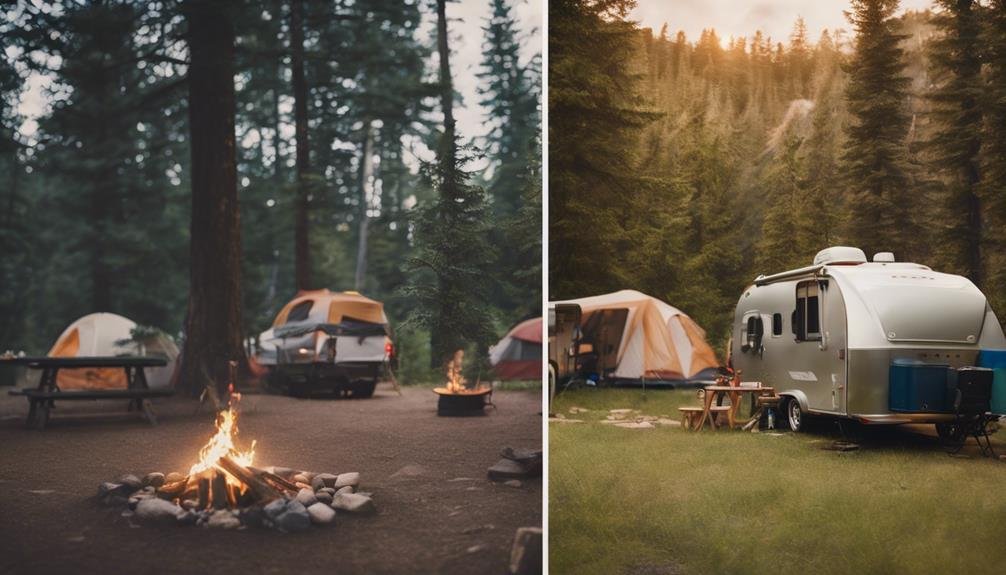
When I think about the amenities at backcountry campsites versus developed campgrounds, I realize how different the experiences can be.
Developed campgrounds often provide easy accessibility, restrooms, and waste disposal options, while backcountry spots require more self-sufficiency and adventure.
Understanding these key differences can help me choose the right camping experience for my needs.
Campsite Accessibility
Campsite accessibility varies significantly between backcountry and developed campgrounds, as the latter often offers amenities like restrooms, running water, and designated sites that cater to a wider range of campers. When I venture into developed campgrounds, I appreciate the ease of campsite reservations, which often allow me to secure a spot in advance, ensuring I don't have to scramble for a place to stay after a long drive.
On the flip side, backcountry camping brings a sense of freedom but requires me to be more self-sufficient. I often find myself hiking miles into the wilderness, where there are no maintained facilities. Here, I rely on my skills for campsite maintenance, like finding a flat area for my tent and managing my own waste. While this adds an element of adventure, it also means I've to be prepared for unexpected challenges.
Ultimately, my choice between the two boils down to what kind of experience I'm after. If I crave comfort and convenience, I'll head to developed campgrounds. But if I want to escape into nature and embrace simplicity, backcountry camping calls my name.
Available Facilities
Developed campgrounds typically provide a range of amenities that make camping more comfortable, including picnic tables, fire pits, and access to electricity, which I often find essential for a more relaxed outdoor experience. These features really enhance my time in nature, allowing me to enjoy the wilderness without sacrificing too much comfort.
Electrical Hookups: Being able to plug in my devices means I can keep my phone charged for navigation and photography, plus it allows me to use small appliances like a coffee maker.
On-Site Concessions: Having food options nearby is a game-changer. I love being able to grab snacks or last-minute supplies without having to venture far from my campsite.
Restrooms and Showers: Clean facilities make a significant difference, especially after a long day of hiking. It's nice to freshen up and enjoy a bit of privacy.
While backcountry camping has its allure, the availability of these facilities at developed campgrounds often makes my outdoor adventures feel more like a mini-vacation.
Waste Disposal Options
Having access to proper waste disposal options is a crucial factor that influences my camping experience, as it ensures both cleanliness and environmental responsibility.
When I'm at a developed campground, I appreciate the convenience of designated waste disposal sites. These areas typically offer well-maintained trash bins and recycling options, making waste disposal management straightforward. Knowing I can dispose of my waste properly allows me to fully immerse myself in nature without worrying about leaving a negative impact.
In contrast, backcountry camping presents unique challenges. I often rely on my own waste handling techniques, such as using portable toilets or packing out all my waste. While this option offers a deeper connection to the wilderness, it also requires more planning. I find it essential to carry the right supplies, like waste bags and a trowel for digging cat holes, to minimize my footprint.
Both experiences offer freedom, but the level of waste disposal convenience greatly differs. Ultimately, I choose my camping style based on how much I value those amenities and the extent to which I want to engage with the environment responsibly.
Accessibility and Location Factors
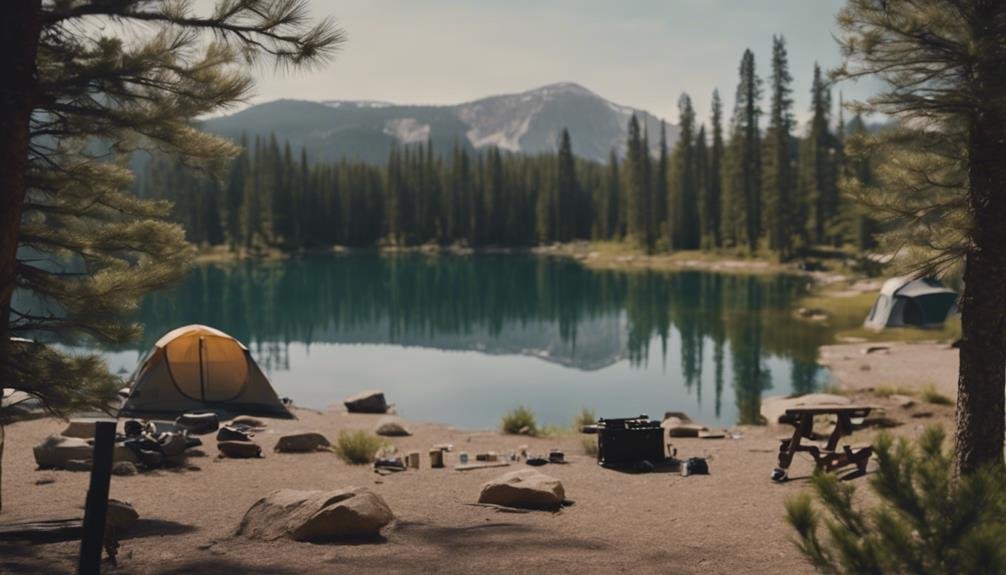
When I think about accessibility and location factors, the proximity to amenities plays a crucial role in my camping choice.
Developed campgrounds often offer easy access to facilities like restrooms and stores, whereas backcountry spots might require a hike through rugged terrain.
Understanding the trail access and landscape helps me weigh the trade-offs between convenience and adventure.
Proximity to Amenities
Choosing between backcountry camping and a developed campground often boils down to how close I want to be to essential amenities like restrooms, water sources, and food supplies. For me, the balance between enjoying nature and having access to comforts significantly influences my camping experience.
Developed campgrounds typically feature restrooms, which can be a lifesaver for those who prefer not to deal with the wilderness' more rustic options. In backcountry camping, I often find myself relying on my own gear, raising privacy concerns if I'm not prepared.
Having a water source nearby is crucial. Campgrounds usually provide easy access to potable water, while backcountry camping might require me to filter or carry my own, which can be a hassle.
In a developed campground, I can stock up at local stores before my trip, eliminating the need to pack everything. Backcountry camping means more planning and less flexibility, which can lead to crowding issues if I'm not careful about my route.
Ultimately, my choice hinges on how much I value convenience versus solitude.
Terrain and Trail Access
The rugged trails of backcountry camping invite adventure, but they often demand a level of physical fitness and navigation skills that I must be prepared to tackle. Each step takes me deeper into the wilderness, where trail conditions can shift dramatically. One moment, I'm trekking over soft pine needles, and the next, I'm scrambling over rocky terrain or trudging through mud. It's exhilarating, but it also means I need to assess my abilities and gear.
Navigational challenges are another aspect I can't overlook. Unlike developed campgrounds with clear signs and paths, the backcountry often requires me to rely on maps, compasses, or GPS devices. I've learned that a wrong turn can lead to hours of backtracking, so I pay close attention to my surroundings. Finding the right trail can be a rewarding journey in itself, but it demands respect for nature and preparation for the unpredictability it brings.
If I crave solitude and the thrill of discovery, backcountry camping offers that freedom. But I also need to weigh the physical demands and navigational skills required—after all, adventure is only as enjoyable as my ability to navigate it.
Safety and Risks Involved
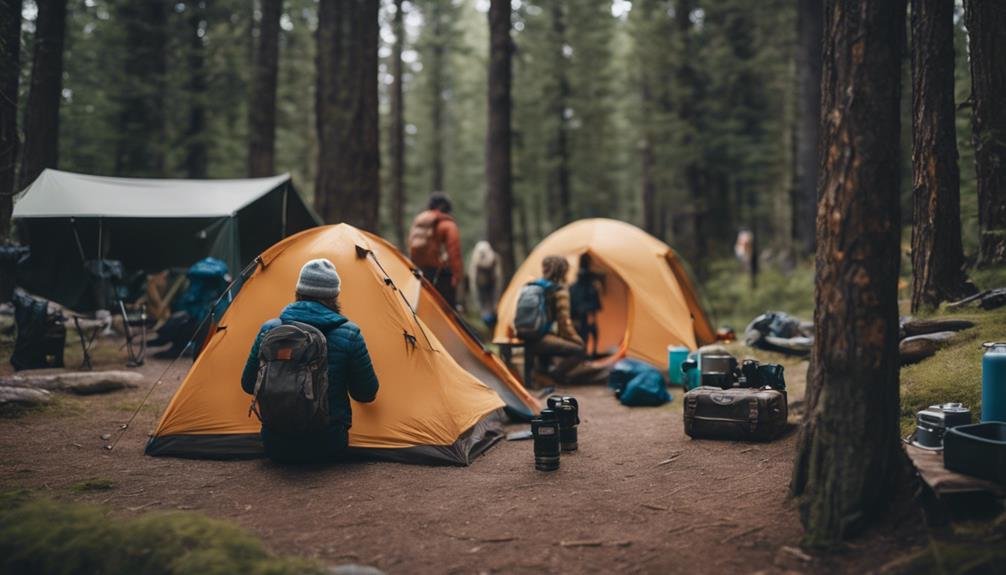
Backcountry camping offers a thrilling escape into nature, but it also comes with unique hazards that require careful preparation and awareness. I've learned that embracing the wild means I must respect its unpredictability.
Wildlife Encounters: While spotting animals can be exhilarating, I've encountered creatures that can pose serious threats. Knowing how to react during a bear sighting or dealing with snakes is crucial. I always make noise while hiking to avoid surprising them.
First Aid Preparedness: I never leave without a well-stocked first aid kit. Accidents can happen, from scrapes to more severe injuries. I've taken the time to learn basic first aid skills, ensuring I can manage emergencies until help arrives.
Weather Awareness: The elements can change rapidly. I check forecasts before heading out and carry gear suitable for sudden storms. A clear plan helps me stay safe amidst unpredictable conditions.
Environmental Impact Considerations
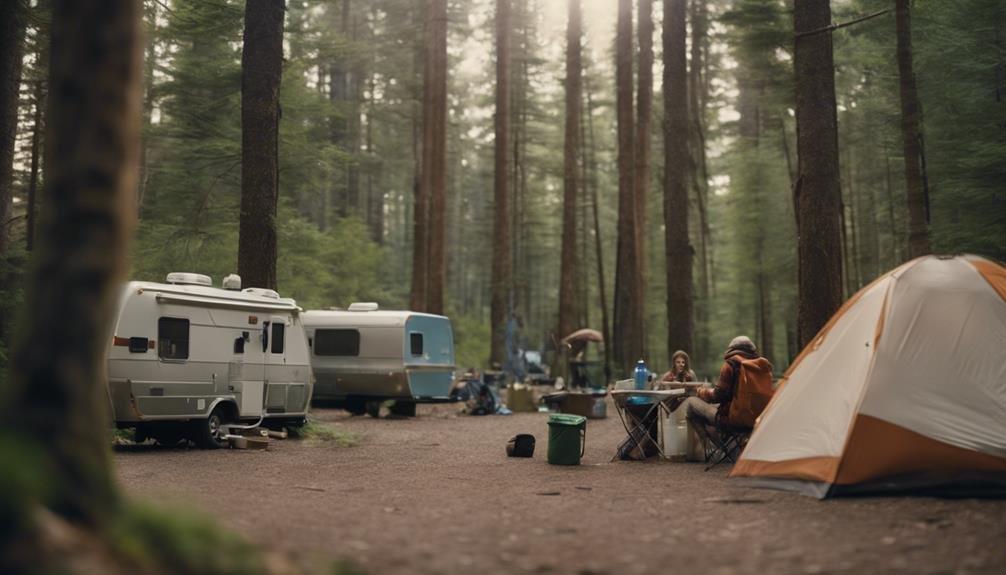
Understanding the environmental impact of my camping choices is crucial for preserving the natural beauty I love to explore. When I choose between backcountry camping and developed campgrounds, I always consider the environmental regulations in place.
Developed campgrounds often provide facilities that minimize my carbon footprint, like waste disposal and designated fire pits, which help protect delicate ecosystems.
On the other hand, backcountry camping allows me to connect deeply with nature, but I must tread lightly. It's essential to follow Leave No Trace principles, ensuring I pack out everything I bring in and avoid disturbing wildlife.
I find it liberating to camp in remote areas, but I've to be mindful of my actions, as they can leave lasting impacts on fragile environments.
Each choice I make has consequences, from the trail I take to the waste I produce. By being aware of these factors, I can enjoy my adventures while also contributing to the preservation of our beautiful landscapes.
Ultimately, my goal is to experience freedom in the wild without compromising the very essence of nature that draws me in.
Skill Level and Experience Requirements
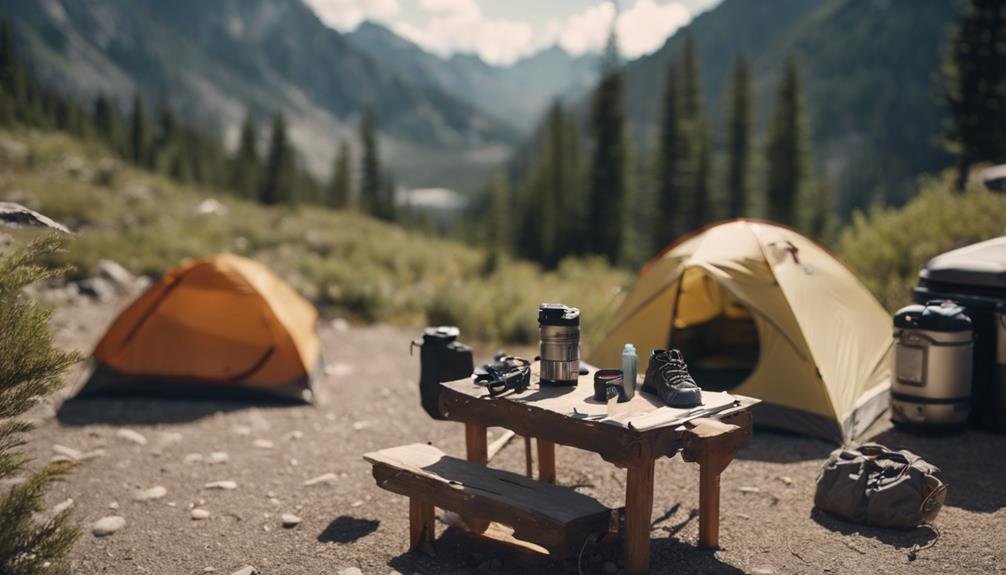
Choosing between backcountry camping and developed campgrounds often hinges on my skill level and experience, as each option presents unique challenges and rewards. When I think about venturing into the wild, I realize that the freedom of backcountry camping requires a solid foundation of skills.
Packing Skills: I need to ensure I can pack efficiently, balancing weight and necessity. Every item must serve a purpose, whether it's food, shelter, or safety gear.
Navigation Abilities: In the backcountry, I can't rely on paved paths or signs. Mastering maps and compass use is essential to find my way through unmarked trails, and GPS devices can be a helpful backup, but they shouldn't replace fundamental navigation skills.
Survival Knowledge: I must be prepared for emergencies. Understanding how to build a fire, purify water, and identify local wildlife can make all the difference in a challenging situation.
Developed campgrounds often provide more amenities, making them a great choice for those still honing their outdoor skills. But for me, the thrill of backcountry camping is worth the preparation.
Cost Comparisons
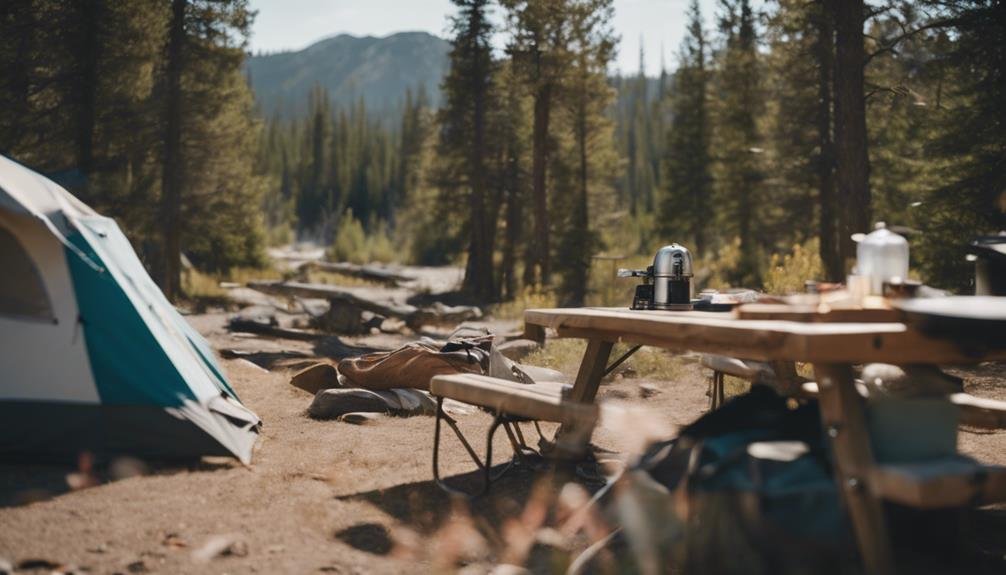
When I weigh the costs of backcountry camping against developed campgrounds, I quickly realize that my budget plays a significant role in my decision-making process. Backcountry camping often comes with lower fees, sometimes even free, which is a huge draw for anyone looking to stretch their dollars. I've found that using cost-saving strategies, like packing my own food and opting for free campsites, can make a real difference.
On the other hand, developed campgrounds usually charge a fee, but they offer amenities like restrooms, showers, and sometimes even fire pits. These conveniences can be worth the price if I'm looking for a more comfortable experience.
I also consider my budgeting considerations; while I might splurge occasionally on a developed campground, I appreciate the freedom and solitude that backcountry camping provides without the financial burden.
Ultimately, it boils down to what kind of experience I'm seeking. If I want an adventure without breaking the bank, backcountry camping wins. But if I prefer some comforts, the small fee for a developed campground could be worth it.
Social Interactions and Community
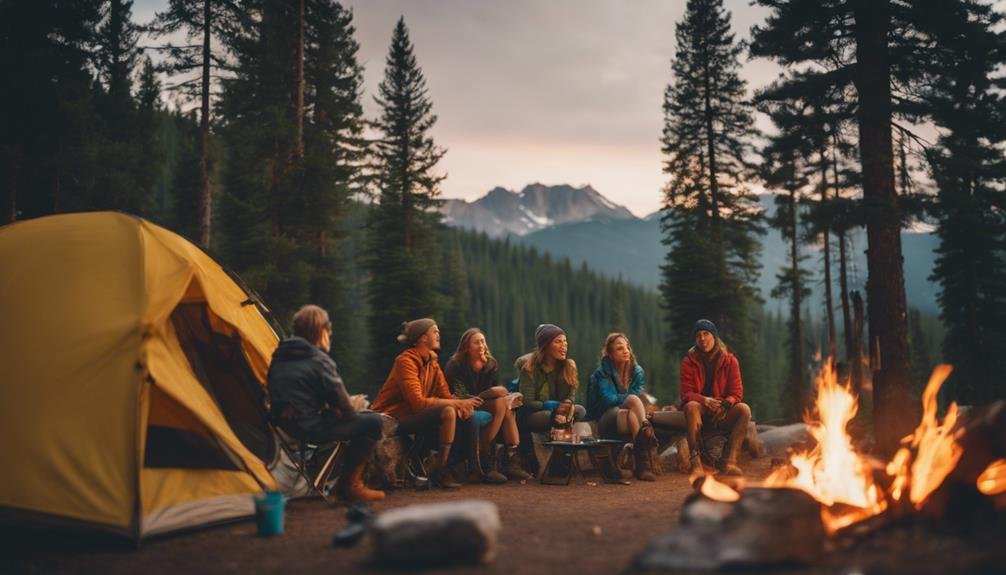
When I think about social interactions while camping, I can't help but compare the warmth of campfire conversations in backcountry settings to the bustling community feel of developed campgrounds.
In established sites, shared amenities and organized group activities create a vibrant atmosphere that fosters connections among campers. Whether swapping stories by the fire or participating in events, each environment offers unique opportunities to engage with fellow adventurers.
Campfire Conversations and Stories
Gathered around a crackling campfire, I've found that stories shared under the stars often forge connections that last long after the flames have died down. There's something magical about the flickering light and the soothing sounds of nature that invites us to open up and share our experiences. Fireside lore flows freely, and I always leave with a wealth of new perspectives and camaraderie.
The art of storytelling can captivate any audience, transforming simple experiences into epic tales that resonate with everyone around the fire.
Whether it's a perfect s'more or a gourmet meal cooked over the flames, sharing recipes and cooking tips adds a delicious twist to our gatherings.
We bond over adventures, fears, and triumphs, creating a tapestry of memories that enriches our time in the wilderness.
In these moments, I realize that backcountry camping isn't just about nature; it's about the relationships we build under the stars, knitting us together in a shared love for freedom and exploration.
Shared Amenities and Facilities
As the campfire embers fade, the allure of shared amenities and facilities at developed campgrounds draws me into a vibrant community where social interactions flourish and friendships are forged over common interests.
The feeling of camaraderie is palpable as I stroll past picnic areas and communal kitchens, each space a hub of laughter and storytelling. These amenities not only enhance my camping experience but also encourage connections with fellow campers.
I appreciate how site maintenance plays a crucial role in creating this inviting atmosphere. Clean restrooms, well-kept trails, and tidy picnic areas invite me to linger and engage with others. Staffing considerations are also vital; friendly campground hosts create a welcoming environment, offering tips or simply a cheerful smile.
In developed campgrounds, I often find myself exchanging stories while sharing a grill or gathering around a fire pit. The sense of community is comforting, making me feel like I'm part of something larger.
While backcountry camping offers solitude and freedom, the shared facilities of developed campgrounds provide a unique opportunity to connect, share experiences, and create lasting memories with fellow adventurers.
Group Activities and Events
What better way to deepen connections with fellow campers than by participating in the lively group activities and events that developed campgrounds often host? I've found that these gatherings can transform a solo trip into a vibrant social experience, making the wilderness feel like a community.
Group Potluck Meals: There's something magical about sharing food. I cherish the variety of dishes everyone brings, often discovering new recipes while swapping stories around the campfire.
Organized Group Hikes: These hikes are perfect for meeting fellow nature lovers. I appreciate the camaraderie that builds as we explore trails together, sharing laughter and breathtaking views along the way.
Campfire Storytelling Nights: There's nothing quite like gathering around a crackling fire to hear tales of adventure and mischief from other campers. It fosters a sense of belonging and inspires me to share my own experiences.
In developed campgrounds, these activities create a unique blend of connection and adventure, giving me the freedom to embrace the outdoors while forming friendships that can last a lifetime.
Personal Preferences and Priorities
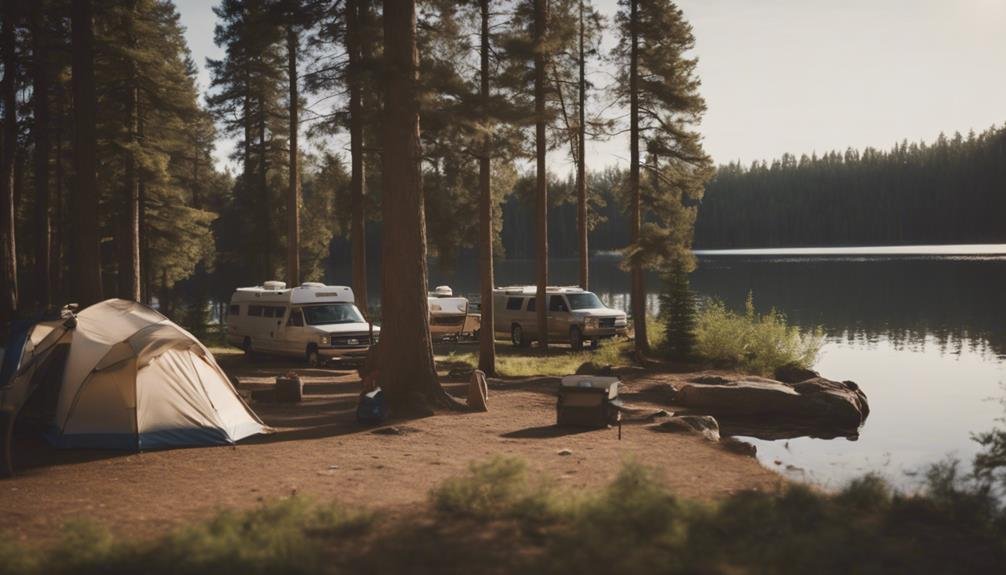
When it comes down to choosing between backcountry camping and developed campgrounds, my personal preferences and priorities often shape the experience I seek in the great outdoors. I crave that elusive work-life balance, and the type of camping I choose plays a huge role in my personal fulfillment.
For me, the decision hinges on what I'm hoping to achieve. Here's how I break it down:
| Backcountry Camping | Developed Campgrounds |
|---|---|
| Solitude and adventure | Social interactions |
| Closer to nature | Amenities and convenience |
| Physical challenge | Ease and accessibility |
When I'm drawn to backcountry camping, I'm searching for that intimate connection with nature, where I can escape the noise of daily life. On the other hand, developed campgrounds provide a sense of community and comfort, perfect for those weekends when I want to unwind without too much hassle. Ultimately, it's about finding what resonates with me at that moment, ensuring my outdoor experiences align with my values and aspirations.
Conclusion
Ultimately, choosing between backcountry camping and developed campgrounds boils down to personal preference.
I've found that 58% of campers prefer the amenities of developed sites for their convenience, while others crave the solitude of the backcountry.
For me, the thrill of venturing into the wild outweighs the comforts of established campgrounds.
Whichever path you choose, it's all about what resonates with your spirit of adventure and how you connect with nature.
